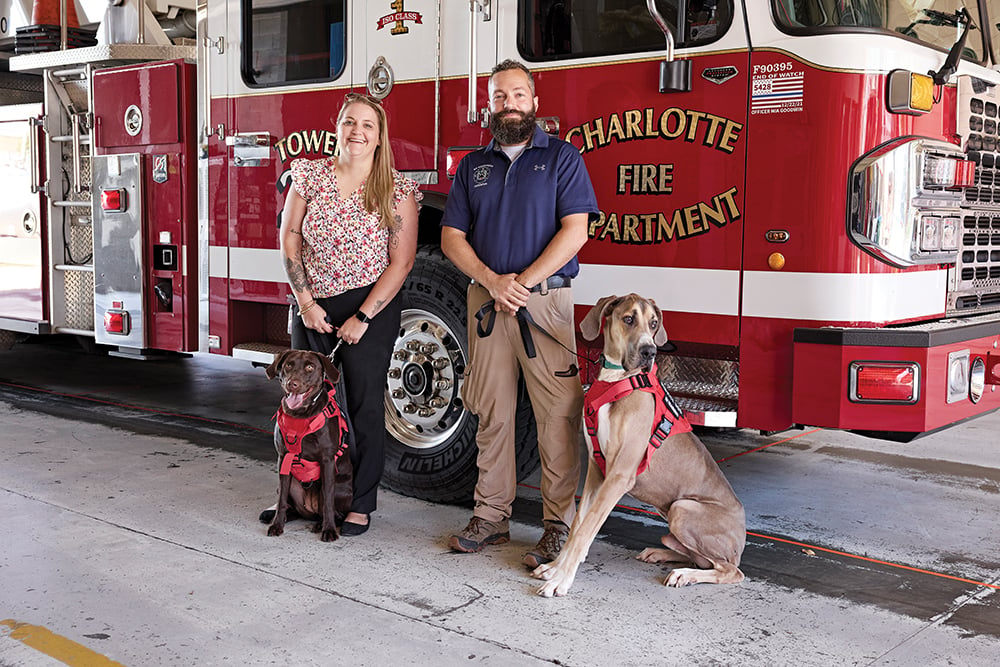2025 Charlotteans Of The Year: K9 Responder Foundation
A former firefighter harnesses the power of dogs to help first responders and veterans in need

It’s like one of those kids’ puzzles to find the 12 dogs in Rick Dunton’s house east of Charlotte.
There’s no barking, no whining, barely even a whiff of doggy smell. One is closed up in Dunton’s office, in temporary quarantine while he’s being treated for border cough. Another, Herman, sits patiently in a large cage while he’s being house-trained. Herman was evidence in a dog-fighting case. His former owner is serving 7 to 10 years in prison. You have to look closely to see that Herman has no eyes. His sweet nature causes some to doubt he was a fight dog.
“I didn’t say he was a good fight dog,” Dunton teases him affectionately, putting his hand next to the cage to let Herman take an eager sniff.
The house usually holds Dunton, 38, a dog trainer and former firefighter; his wife, midwife Lisa Dunton; their two daughters, 6 and 3; and Dunton’s mother, who’s often there to help with the kids. And yes, there are 12 dogs at the moment, four of the Duntons’ and eight rescue dogs being treated for various issues and getting new lives, mostly as therapy dogs.
Dunton started out as a firefighter in Rochester, New Hampshire. After 10 years, he realized he really wanted to be a fire marshal, so he moved to Charlotte, hoping to transition into that kind of work with the Mecklenburg County Fire Marshal’s Office. While he waited for an opening, he switched to the Charlotte Fire Department as an educator, working with schools and at public events.
In 2019, he met a firefighter who was on light duty after an injury. She wanted to start a therapy dog program for her department. But therapy dogs are expensive, and the department couldn’t provide one. That’s when Dunton got an idea: “What if we made it a fire education dog and use it as a therapy dog?” That’s when Dunton got Cat, then an 18-week-old golden retriever with a cream-colored coat.
Dunton wasn’t a dog trainer, but Cat was special. “She was built for this,” he says. All dogs have heightened senses of smell. When we’re under stress, our adrenal glands release cortisol, a hormone with a distinct smell that dogs notice. All dogs can smell cortisol, Dunton says, but not all dogs care. Cat is one of those dogs who care, moving closer to anyone struggling with stress.
After the pandemic, Dunton got serious about training therapy dogs to live with firefighters. He decided to leave the department and retrain to work with therapy dogs. Nicole Burg, a daughter of Marine veterans who works in behavioral health with CFD, took over the department’s therapy dog program, working with her own dog, Asher.
Dunton started K9 Responder Academy to train therapy dogs, used to improve moods. But Dunton and Burg soon realized there was another kind of need: It costs $5,000 to get a service dog, task-trained to help specific individuals with disabilities. The price can go even higher depending on the company and the type of training. Service dogs for the blind, for instance, can cost $10,000 to $50,000, and the wait list can take months. A lot of first responders and veterans can’t pay that, and most veterans’ benefits and insurance don’t cover it.
Dunton and Burg got the idea to set up a nonprofit foundation alongside Dunton’s business to allow them to accept both donations and rescue dogs who could be trained to work with people struggling with trauma and stress. Dunton works with two other trainers, both first responders and veterans who have lived with trauma. Burg serves on the board and helps to evaluate people and dogs for a good match.
K9 Responder Foundation has been able to provide trained therapy dogs for first responders. After four members of a Charlotte law enforcement task force were killed and five were injured in a shootout on April 29, 2024, Dunton’s organization retrained dogs that belonged to injured Charlotte-Mecklenburg Police officers Justin Campbell and Mike Giglio at no cost so they could provide service and support for their owners.
After Hurricane Helene in September 2024, Dunton and his crew went to Burnsville to rescue four dogs who were trapped on a mountain. K9 Responder Foundation ended up making an offer: They’d provide and train a therapy dog for free for any fire and rescue department that lost a member in the storm. They’ve placed two so far: One in Saluda County, where the fire chief and a volunteer firefighter were killed by a falling tree, and another in Fairview, where a fire chief was lost in a landslide that killed 13 people.
For first responders and vets who are struggling with trauma, having a dog to focus on can mean the difference between living and giving in to depression and suicide. The wife of one Gaston County officer who almost died in the line of duty told Dunton, “My daughter has her father because of that dog.”
“God gave me the skill set to do this,” Dunton says. “I need to do what lets me sleep at night.”






